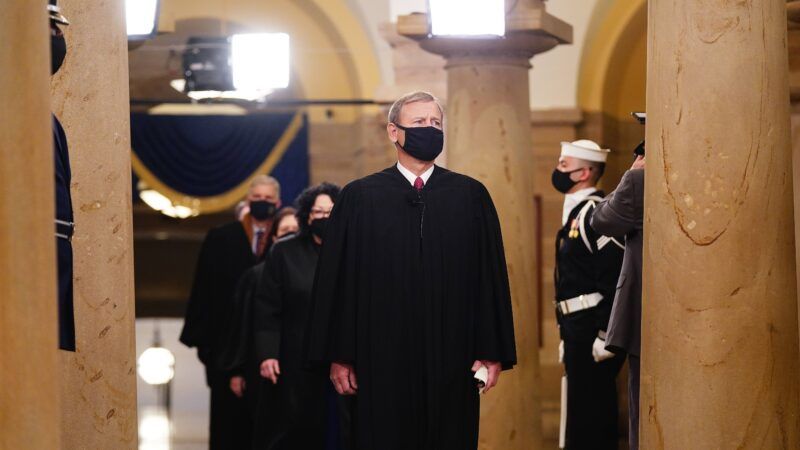SCOTUS, Under Fire From Left and Right, Is Back in Session With Guns and Abortion on the Docket
The justices robe up for another term.

The U.S. Supreme Court returns today from its summer break. As the justices robe up for another term, they face both a docket loaded with hot-button cases and an increasingly fraught political climate full of attacks on judicial independence coming from both the left and the right.
Things will seriously heat up on November 3 when the Court hears oral arguments in New York State Rifle & Pistol Association v. Bruen, which asks whether the Empire State's strict concealed-carry licensing scheme violates the Second Amendment. This one looks to be the Court's biggest gun rights case in years. In fact, the impending Second Amendment showdown is already creating deep divisions among ostensible allies.
Case in point: In July, a group of public defense lawyer organizations, including the Black Attorneys of Legal Aid, the Bronx Defenders, and Brooklyn Defender Services, urged the Court to strike down the state's gun control scheme for both violating the Second Amendment and disparately harming racial and ethnic minorities. "For our clients," the brief stated, "New York's licensing requirement renders the Second Amendment a legal fiction. Worse, virtually all our clients whom New York prosecutes for exercising their Second Amendment rights are Black and Hispanic." And that, the brief argued, "is no accident. New York enacted its firearm licensing requirements to criminalize gun ownership by racial and ethnic minorities. That remains the effect of its enforcement by police and prosecutors today."
By contrast, the American Civil Liberties Union (ACLU) and the New York Civil Liberties Union (NYCLU), which might normally be expected to side with the public defenders, have taken the opposite view of government power in this dispute. The ACLU and NYCLU want New York's police and prosecutors to keep on enforcing the state's gun control scheme. According to their brief, "the Second Amendment permits states to impose reasonable regulations on public carry to preserve the safety and peace conducive to civil life." Expect to hear more about this rift between public defenders and the ACLU as the case takes center stage.
Barely a month after the Supreme Court tackles guns, the justices will weigh arguments about abortion. On December 1, the Court is set to hear Dobbs v. Jackson Women's Health Organization, which asks whether Mississippi's ban on nearly all abortions after the 15th week of pregnancy violates those SCOTUS precedents that recognize a woman's constitutional right to have an abortion. Mississippi has specifically urged the justices to overturn those precedents. With Roe v. Wade (1973) and Planned Parenthood of Southeastern Pennsylvania v. Casey (1992) thus up for possible reconsideration, Dobbs is set to be the Court's biggest abortion case in many years.
And while all of that is happening, the Supreme Court itself will be facing loud and sustained political attacks from both the left and the right.
On the left, many activists are already pressuring President Joe Biden to pack the Court with friendly jurists who will predictably uphold the Democratic policy agenda. These calls for liberal court packing have not gone unnoticed at the Supreme Court. Indeed, the Court's longest-serving Democratic appointee, Justice Stephen Breyer, has publicly rebuked the court packers. In his new book, The Authority of the Court and the Peril of Politics (Harvard University Press), the 83-year-old justice argued that if the liberal court packers get their way, they will be guilty of trashing the Court's legitimacy, something that will put liberalism itself in long-term danger.
Meanwhile, on the right, there are now calls for SCOTUS to embrace a vigorous right-wing agenda regardless of any pesky constitutional limits that might get in the way. Conservative Harvard law professor Adrian Vermeule, for example, is currently imploring the legal right to ditch originalism in favor of what he calls "authoritative rule for the common good." In Vermeule's telling, the problem with the Supreme Court is that its use of originalism has led to a number of libertarian results.
"Under a regime of common good constitutionalism," Vermeule has argued, "libertarian assumptions central to free-speech law and free-speech ideology" must necessarily "fall under the ax." What is more, "libertarian conceptions of property rights and economic rights will also have to go, insofar as they bar the state from enforcing duties of community and solidarity in the use and distribution of resources." (Plenty of liberal court packers would probably agree with Vermeule on all of the above, substituting their own vision of the "common good," of course.)
In sum, the Supreme Court is taking heavy political flak while the justices are preparing to hear hugely controversial cases. Things will only get crazier from here.


Show Comments (140)